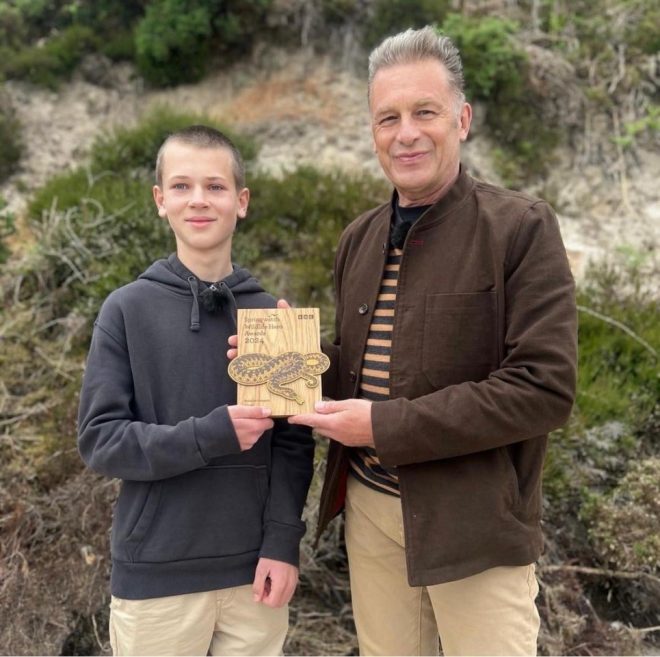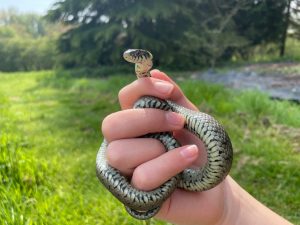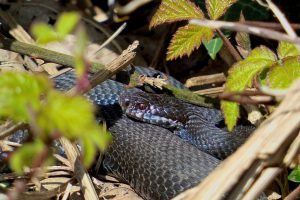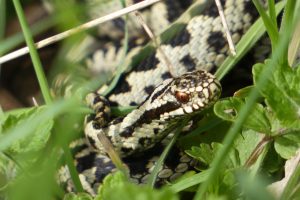Boy who goes extra mile to help reptiles in South Downs picks up national award
July 8, 2024
 Meet Reuben Martin, who recently won the BBC’s Under-18 Springwatch Wildlife Hero Award for 2024. We caught up with 15-year-old Reuben, who lives in Shoreham, to find out about his volunteering work to help the reptiles and amphibians of the National Park.
Meet Reuben Martin, who recently won the BBC’s Under-18 Springwatch Wildlife Hero Award for 2024. We caught up with 15-year-old Reuben, who lives in Shoreham, to find out about his volunteering work to help the reptiles and amphibians of the National Park.
How does it feel to be a wildlife hero?
It feels incredible and very surreal. There are so many other amazing wildlife heroes out there, so it was a great honour to be chosen for this award!

Why are you so passionate about helping amphibians and reptiles?
I’m extremely passionate about helping amphibians and reptiles for a few big reasons, one of them being my obsession with them ever since I was very young. Another is that I feel they are often very neglected when it comes to habitat management, and sometimes demonised in the media. I want to try to change that as much as I can, which is why l’m so passionate about their conservation.
Where do you monitor reptiles exactly and how do you monitor?
I monitor six sites for reptiles and two for amphibians, all in the South Downs National Park.

The chalk downland is an extremely important habitat for our four so called “common” native reptiles – adders, grass snakes, slow worms and common lizards – which are all declining throughout the country, yet the chalk downland can hold really healthy populations. Adders are in real trouble through fragmentation and habitat loss, and chalk downland is one of the best habitats for them, and their continued presence on a site indicates a healthy ecosystem. I cannot give away the exact locations of the sites, as sadly there are people out there who may wish to hurt or collect reptiles, particularly adders, which could be devastating to their numbers.
We survey each site a minimum of six times a year. These surveys are completed through us slowly walking a route that’s been plotted on a map through the site, and trying to find as many reptiles as we can. We also place down artificial cover objects which we lift to help us understand the populations of more secretive reptiles such as slow worms and grass snakes.
Why is monitoring important?
Maybe the biggest reason is that until we know something is there, they usually aren’t considered in habitat management. Our data all goes to the rangers of our sites, which tells them exactly where we have found certain reptiles, hotspots for them, hibernation areas, and how many we have found. That way, us and the rangers can assess the health of these populations as well as plan for habitat management, and how we can boost those populations. Through monitoring, we can also see if the population is increasing or decreasing, which tells us if something is maybe going wrong on a site, or if things are improving. Another huge reason why monitoring is important is due to our surveys being a part of the national reptile/amphibian survey run by The Amphibian Reptile Conservation Trust (ARC), who we volunteer for. The data from every single survey countrywide carried out by all the volunteers goes to ARC, so that they can learn patterns and trends within these species, to build our understanding of their lives, so that we can learn how to conserve them.
What was it like to meet Chris Packham?
Meeting Chris Packham (pictured above) was the coolest thing ever. He’s been my wildlife hero since I was very young, so to meet him was a very surreal and awesome experience. He was so kind to me through the whole experience, and even brought with him old grass snake egg to show me!
What’s next for you in terms of helping nature?
 During my spare time, I will continue to survey at as many sites as I can and get involved in any way possible to help these misunderstood and underrated creatures, as they need all the help that they can get. In the future, I want to pursue a career in conversation, l’m not sure exactly in what way yet, but a job which helps our native reptiles and amphibians to thrive is the goal for me.
During my spare time, I will continue to survey at as many sites as I can and get involved in any way possible to help these misunderstood and underrated creatures, as they need all the help that they can get. In the future, I want to pursue a career in conversation, l’m not sure exactly in what way yet, but a job which helps our native reptiles and amphibians to thrive is the goal for me.
Dad Tim Martin, who nominated Reuben, added: “I nominated Reuben because he gives so much of his time and energy to helping our native reptiles and amphibians, and cares so much about helping them. He never moans about it, he always wants to go, and when he can’t be out there, he does what he can from home with habitat management advice, and through his Youtube channel, Reuben’s Reptiles.
